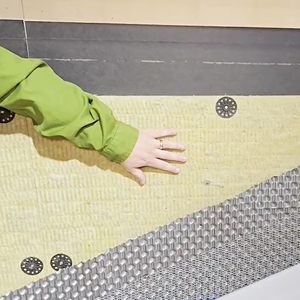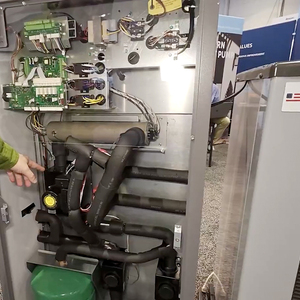Yesterday i told a homeowner that i could do his job (remodel aprox. $100,000) for T&M. I expained without giving specific numbers that ” the contract would state an hourly rate for me plus a specified markup on subs and materials.” He then called me today and said they really want me to do the job but would i instead just raise my hourly rate and not mark anything up. I told him id think about it. Any thoughts on the subject?
Discussion Forum
Discussion Forum
Up Next
Video Shorts
Featured Story

Discover a concrete-free foundation option that doesn't require any digging.
Highlights
"I have learned so much thanks to the searchable articles on the FHB website. I can confidently say that I expect to be a life-long subscriber." - M.K.
Fine Homebuilding Magazine
- Home Group
- Antique Trader
- Arts & Crafts Homes
- Bank Note Reporter
- Cabin Life
- Cuisine at Home
- Fine Gardening
- Fine Woodworking
- Green Building Advisor
- Garden Gate
- Horticulture
- Keep Craft Alive
- Log Home Living
- Military Trader/Vehicles
- Numismatic News
- Numismaster
- Old Cars Weekly
- Old House Journal
- Period Homes
- Popular Woodworking
- Script
- ShopNotes
- Sports Collectors Digest
- Threads
- Timber Home Living
- Traditional Building
- Woodsmith
- World Coin News
- Writer's Digest


















Replies
Thoughts on the subject?
Yeah. What's the point?
Why don't you do it lump sum, with progress payments? That is the way to make money, and keep clients happiest?, IMHO.
We start one next week about the same size, moneywise, as yours. One big number, period. Payments at 30-30-30-10, percentagewise, with the first 30 already in hand.
We don't want the client to see bills for lumber, screws, shingles, etc. It just bogs things down, and it can give the client something to pick at, like, "I saw that at Lowe's for less."
Who needs that?
Couple thoughts...
How much of this will be hands on for you vs. subbed out? If you plan on doing most of the work yourself you might be o.k. If you plan on subbing alot out that would be foolish.
If you estimate alot of time off the job site you might have a hard time billing that time out.
Do your clients plan on paying the invoices directly? If I had a large remodel going on in my home I may want to put some on a credit card which may not be feasable if you (the contractor) buy it, mark it up and then expect a check for it.
Sounds like a long conversation with the HO is in order.
Good luck.
Seems you already gave him a price. Approx 100 grand. Whats to think about?
Raise your price... lower your price.... mark up... no mark up.... who cares as long as it's 100 g's.
We use this method but we do mark up any materials that we will have to warranty. An example of this is windows and doors. If we break a window or have some other installation problem, this is likely to cost us quite a bit to fix. If the owner is willing to accept any problem that may arise with this type of product, we can give it to them at the straight cost.
As long as you are making the money that you want, any method can work. There are many people here who will only use a fixed price contract and a seemingly equal number who prefer T&M. My observation is that those who have the most professional and business-like operations more often use a fixed price contract. This is probably because they are more certain of their costs and more organized in their preparation of the contract. A fixed price contract requires this as well as a more complete set of plans and specifications.
On the other hand, a t&m contract allows a project to proceed without many of the decisions in place. Instead of the certainty created by a fixed price, the parties need to establish a realistic budget and a relationship of trust. We have been successful with this approach though it is not without pitfalls.
the reason for the T&M approach is that the client is undecided about the details. I realize i could just wait until he makes all his decisions but i dont mind working T&M generally to allow that flexibility for the HO. I plan to do all the carpentry aspects of the job but their will certainly be subs on the job.
"Undecided about details."
Does that mean product selection? Because if it does, take care of it with budgeted allowances.
If means the scope is unclear, then how did you come up with the $100K number?
T&M works well on some commercial projects, i.e. you're dealing with pros. For residential, in general it doesn't work well. HOs tend to put a very low value on anything other than "brick and mortar". Such as "why should I pay someone to buy something at the store? I can do it myself for free".
If the customer is undecided on details and you want to proceed, make some "middle of the road" assumptions and put allowances on those items. That way you can bill later the + or - differences.
Here is where you can get in trouble with the proposed scheme. To cover your O&P, etc. you might have to charge $120/hour. So the first thing going through his mind is "I'm going to pay $120/hour for a carpenter? You must be kidding!" It only goes downhill from there.
The fact that the HO requested that you price it this way should tell you something. Are you listening?
Good luck,
DG/Builder
"If the customer is undecided on details and you want to proceed, make some "middle of the road" assumptions and put allowances on those items. That way you can bill later the + or - differences."
How is this any different from a t&m contract? Unless the allowances are very limited and explicit in what they allow, this is the area that can be subject to dispute. We have had jobs where the change orders added 30% to the project cost. While we had no trouble collecting the 30%, this was because we communicated the increases to the owner as they occurred and updated the project cost as we proceeded. This is usually done via a series of change orders, though not in this particular case. The owner simply wanted to be informed.
"To cover your O&P, etc. you might have to charge $120/hour. So the first thing going through his mind is "I'm going to pay $120/hour for a carpenter? You must be kidding!"
If the owner knows that you are charging $120/hr and still wants to hire you, what is the problem? What do you have to hide? He knows he is getting more than a carpenter at that price and is willing to pay for it. If the price is outrageous (to him), he simply will not hire you. That is not a problem as long as you have work.
T&M for jobs under $10K is fine, but for a $100K job, get a fixed priced contract. Otherwise at the end you run into the inevitable conversation regarding not purchasing frugally 100% of the time, material overages - in short a renegotiation. Who needs that after the work is completed. You have nothing to trade with and the client has YOUR money in THEIR pocket. YIKES!
Documenting time at the start will go well, but when the client wants to go with a more $$ material and sees the budget is running short, guess who he will try to get the $$ from? Your hourly rate. They will always be comparing what they are paying you with the cost of materials - always.
What happens when something breaks. Who is financially responsible? Along the same lines, when we upcharge for breakage, misordering, warranty, errors in fabrication/ installation, this add'l chatge is amertized over our yearly gross. It does not have a life on a job to job basis. By the client taking that insurance $ away from you, you now have the same exposure with less $ with which to cover yourself - and future clients.
One last thing. Some days we have incredible production rates because we are just that good and because we are sometimes just that lucky. We are in the "Zone." Other days we are slow as heck and make many mistakes. It happens. Clients notice this and think why they are paying the same daily rate for different levels and rates of production. This is not a conversation you want to have during the time span of the project.
Just a few thoughts,
Frankie
There he goes—one of God's own prototypes—a high powered mutant of some kind never even considered for mass production. Too weird to live and too rare to die.
—Hunter S. Thompson
from Fear And Loathing In Las Vegas
Who hires the subcontractors in question? The general contractor.
Who has enough business experience to understand why it's usually smarter to pay more fore the true pro than the company quoting the lowest price? The general contractor.
Who is the first person the customer calls when something goes wrong or they decide they aren't happy with something a subcontractor did or supplied? The general contractor.
Who puts their name and reputation on the line every time a sub contractor interacts with the customer in any way? The genmeral contractor.
Who will still be in business to stand behind their work long after the knuckleheads all decide making 35.00/hour isn't much when you're in business? The general contractor who understands WHY he has to mark up subs and materials.
Mark them up. T&M or bid, makes no difference. Mark them up enough to make doing business a pleasure, not a battle. Tipi, Tipi, Tipi!
http://www.asmallwoodworkingcompany.com
Here in VA there is no sales tax on labor provided by contractors. If I marked up materials I'd have to add sales tax to the mark-up.
I do only T&M jobs.
If something gets broken or miscut a replacement is purched and customer is charged for it. T&M means time and materials. Mistakes are going to be made and there is no way arround it. I can either charge for replacement materials or raise hourly rates to cover the cost, either way the client pays.
My projects are now all custom and smallest has been 3.5 Mil in the last 10 years. I've never had a complaint but I pick my clients VERY carefully.
The only sub I use is a painter.
All your jobs are $3.5 mil and better? Very impressive. This means you have your own in house electricians, plumbers, framers and finish carpenters? How big many employees do you have?I would like to learn about your business model. This is exactly what I have been trying to do. Can't seem to get it off the ground.FrankieThere he goes—one of God's own prototypes—a high powered mutant of some kind never even considered for mass production. Too weird to live and too rare to die.—Hunter S. Thompson
from Fear And Loathing In Las Vegas
So you go sitework to finish and only sub painting?
Do you rent or own your excavation equipment?
How do you go about building a foundation? ICF blocks, or do you own formwork?
So you itemize every nail and 2x4, charge accordingly, then apply VA sales tax?
Are you able to buy 100 percent of all materials going into a project exempt from sales tax, so that your client only pays one tax?